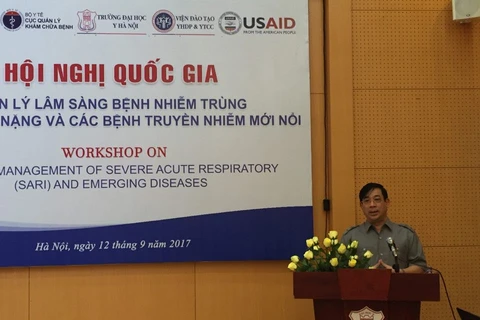 Deputy Minister of Health Nguyen Viet Tien delivers speech at a ceremony to launch a new infectious disease related support training initiative (Source: VNA)
Deputy Minister of Health Nguyen Viet Tien delivers speech at a ceremony to launch a new infectious disease related support training initiative (Source: VNA) Hanoi (VNA) – The Health Ministry’s Medical Services Administration (MSA) and the British Medical Journal (BMJ) on September 27 launched the clinical decision support training initiative to medical services in Vietnam with the aim to improve the detection, diagnosis and control of infectious diseases.
The launch was conducted within the framework of a workshop to transfer BMJ’s professional guidance to Vietnam’s medical check-up and treatment system.
Attending the workshop were Deputy Health Minister Nguyen Viet Tien, UK Ambassador to Vietnam Giles Lever, representatives from the BMJ and the US’s Defence Threat Reduction Agency, and leaders and doctors of hospitals in Hanoi.
Speaking at the event, Deputy Health Minister Tien said improvement of medical services and overcrowding at hospitals was one of the major priorities of the health sector in the coming years.
The cooperation between MSA and BMJ will help the health sector meet the increasing demand of health care and treatment in Vietnam, he added.
“Today’s clinicians deal with a wealth of constantly changing information and it is increasingly difficult to keep the knowledge and practice current. We feel privileged to be using our international expertise to deliver trusted, evidence-based knowledge to Vietnam health care professionals,” Mitali Wroczynski, head of Strategic Partnerships at BMJ, said.
“We will not only help accelerate progress for a world safe and secure from infectious disease threats but also establish a comprehensive and sustainable training and clinical decision support programme that will address broader health care priorities in Vietnam, and support continuing medical education and professional development,” Wroczynski added.
The initiative provides health care professionals with evidence-based online tools and resources, including BMJ Best Practice and BMJ Learning, which together cover over 90 percent of the most commonly presented conditions across primary and secondary care. Clinicians will receive online, offline and mobile access to over 1,000 clinical decision support topics and over 800 online learning modules. A significant proportion of this content will be translated into Vietnamese.
The initiative will help address national notifiable diseases, including Anthrax and Avian Influenza; diseases of significant concern such as Brucellosis; and infectious diseases such as HIV, multi-drug resistant TB and Malaria.
However, the comprehensive coverage provided by the programme will play a dual role in supporting the top health care priorities of Vietnam, including stroke, heart disease, chronic obstructive pulmonary disorder, diabetes, hypertension and many other non-communicable diseases.
Vietnam currently has more than 1,300 hospitals and medical facilities with 250,000 beds that serve 150 million visits of outpatients and 15 million inpatients yearly, according to the health ministry. -VNA
VNA






















